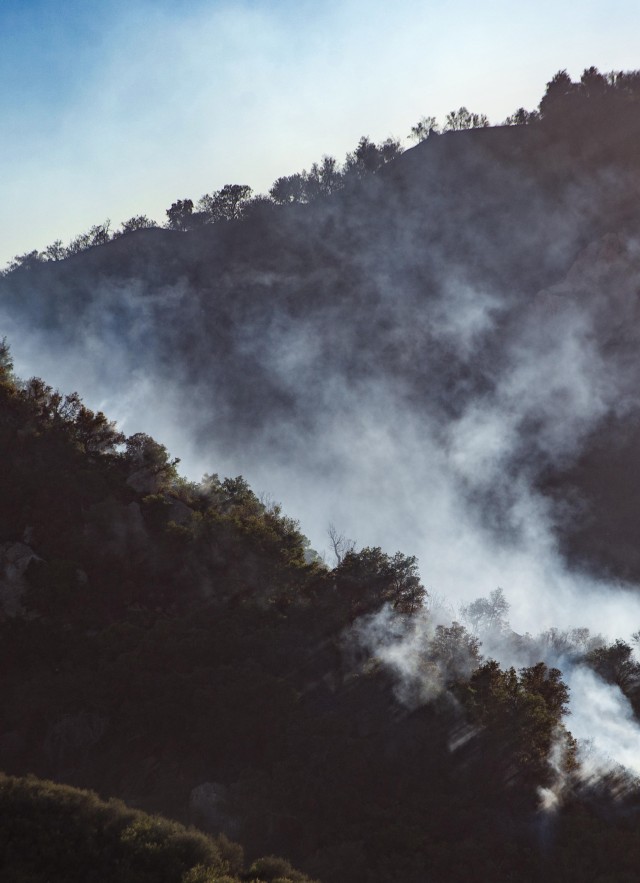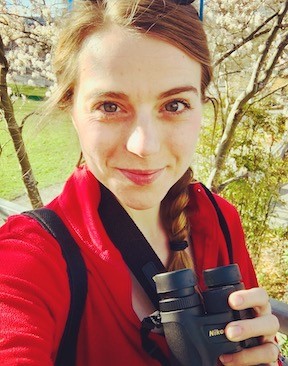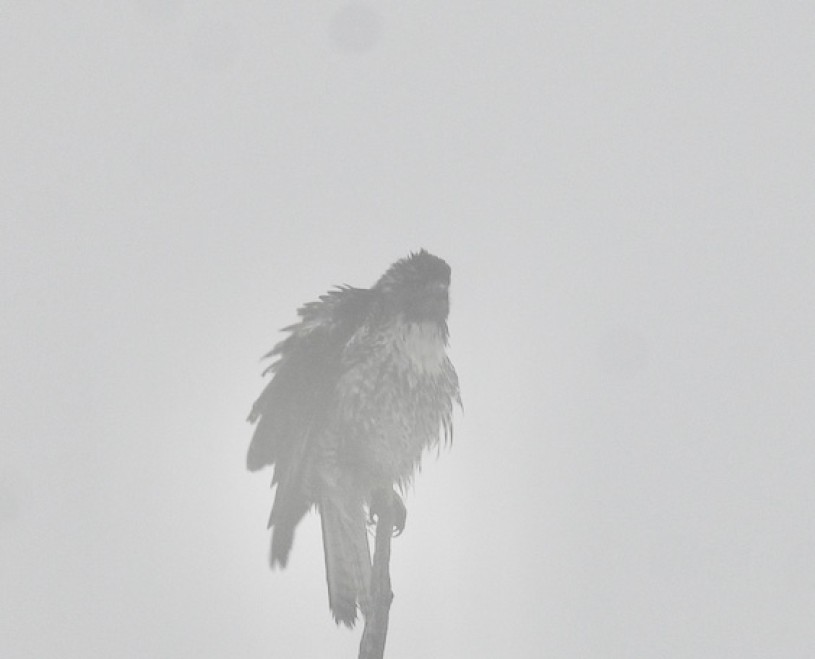BE ADVISED: The museum's parking lot will be closed to guests from Friday, November 1 to Friday, November 15 in preparation for the PST Art + Science Family Festival. Please plan your visit accordingly. For questions or directions, please call 213.763.3466 or email info@nhm.org.
Wildfire Smoke and Birds
A Q&A with Dr. Olivia Sanderfoot, Director of Project Phoenix

Published August 25, 2023
As human-caused climate change continues to accelerate, following environmental news can be overwhelming. If you’re looking for a way to manage your anxiety around things like wildfires and the climate crisis, birds can help. Seriously.
“There's really great research out there that shows that the practice of birding brings a sense of calm, reducing anxiety and depression,” says Dr. Olivia Sanderfoot. “Just being in places that have a greater abundance of birds confers wellness. Truly, having more birds around makes people feel better.”

Dr. Sanderfoot is a Postdoctoral Fellow at the La Kretz Center for California Conservation Science and an Ornithology Research Associate at NHM, and she’s leading a new community science collaboration between the two organizations: Project Phoenix: Investigating Bird Responses to Smoke. We spoke with Dr. Sanderfoot to learn more about the endeavor—the first community science project from NHM to center on birds—and how we can help birds.
What interested you about birds and wildfire smoke?
We know a lot about how wildfire smoke is impacting public health, but we know very little about how wildfire smoke is impacting the health and behavior of animals, including birds. As an ecologist, I'm most worried about birds because birds are highly sensitive to air pollution and likely to experience adverse health impacts upon smoke inhalation.
What we know so far suggests that birds do get sick when they experience smoke inhalation, but we don't know how that plays out in the wild across populations, particularly for species of concern, and we don't know if birds exhibit any behaviors that would help them mitigate exposure to smoke, or reduce those health impacts.
Why would smoke inhalation be a problem for birds in particular?
Birds are highly sensitive to air pollution. The avian respiratory system supports incredibly efficient gas exchange, which is needed to supply the high oxygen demand required for flight. Birds extract nearly double the amount of oxygen with each breath they take compared to mammals! But, this also means that they are more vulnerable to toxic gasses. They also lack many of the mechanisms that mammals use to clear particles, like smoke particulates, from their airways.
Humans might choose to stay indoors or reduce the time we spend outside or turn on our air conditioning or an air purifier—and those steps will reduce the health impacts associated with smoke inhalation because we're actually mitigating the amount of toxic particles that we're inhaling.
Birds can't go indoors. They can't seek shelter in a clean room, but they might lower their activity or reduce their calling or singing rates, or perhaps, even temporarily move to a different location and these types of behaviors might allow them to avoid the brunt of smoke exposure. It's totally unclear if birds are capable of such a response, but if they are, that would tell us a lot about their inherent vulnerability to smoke.

What will participants in the project be asked to do?
We are asking folks to monitor birds in a place that is meaningful and ideally convenient to them between now and October 31st, and all they need to do is conduct a once-a-week, 10-minute point count of all the birds they can see and/or hear. So, you pick a spot and sit or stand at that location, and you document all the birds you see and/or hear from right there. Ideally, folks would survey birds on the same day of the week and as close to the same time of day whenever possible, but if folks need to be flexible and just put in their 10 minutes when they have time, that's fine, too.
What kind of questions will these observations help answer?
We're specifically interested in thinking about how birds move through California and, especially Southern California, and when smoke blows through and what resources they seem to be using. What kinds of places do we observe birds when it’s smoky? What types of habitats are available there? Are there bird feeders or bird baths around? If we can find out what types of resources birds seem to be using when it’s smoky, that could help us learn more about what they may need to persist and thrive during smoke events.
What are some steps we might need to take to help birds?
When people get really, really sick, they tend to lose weight because it just takes a lot of energy to fight off infection and to heal, and that's the same for animals. If birds do experience health effects from smoke inhalation that lead to an energy deficit, they might actually need us to help them stock up on fuels. This could be particularly true for migratory species that come through Southern California during the fall. These are all hypotheses, but Project Phoenix is designed to test these ideas and see if they play out.
For Sanderfoot and the team behind Project Phoenix, a better understanding of how wildfire smoke impacts birds can open the door to even more action. “If folks are thinking about how climate change affects birds specifically when it comes to fire and smoke, that might spur some more climate action in L.A. County.”
Watching birds can do more than help you keep calm and carry on. Your observations can help scientists understand how birds are affected by wildfire smoke—and that understanding can inform how ecologists and public policymakers protect birds and other wildlife through our changing climate and increasingly smoky fire seasons.
Join Project Phoenix to help safeguard birds through smokier summers.
Check out how Project Phoenix volunteers count their birds:
@projectphoenix_socal #project ♬ original sound - Project Phoenix
